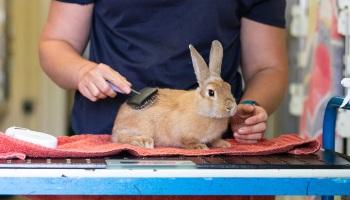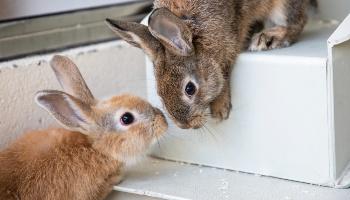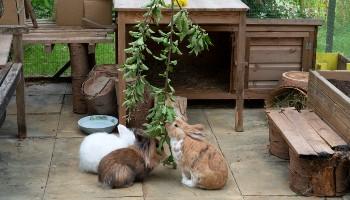Carefully keeping an eye on your rabbits helps you notice the little signs that they're getting older and might need more help to ensure they still enjoy life to the full. Regular health checks are really important for ageing animals, so that health problems can be detected as early as possible. This can help prevent and manage disease, can be less costly and will help give your pets a better quality of life.
Here's our checklist of things to remember when caring for an older rabbit.
Home comforts for older rabbits
Here's how to keep your rabbit happy and comfortable as they get older:
- Keep things accessible: make sure everything they need is within easy reach, such as water, food, toys, hiding places and bedding material. Dotting a few of each of these throughout their enclosure means they won't have to go too far to find what they need.
- Make sure they can grip the floor: older indoor rabbits can find smooth, slippery floors difficult to walk on, so try putting a rug or carpet down to give them something to grip and help them move around more easily.
- Outdoor rabbits can find ramps difficult to negotiate as they get older and you may need to rearrange their enclosure so that it's all on ground level.
- For rabbits that are litter trained, make sure they can still easily enter and exit their tray. They may struggle with high-sided trays, and plastic dog beds can be a good alternative to traditional trays as they already have a low entry point.
- During winter, provide outdoor rabbits with extra bedding material to snuggle into to help them keep warm. If you want to bring them indoors, do this gradually in the run-up to the winter so they have time to adjust to their new environment.
Food and drink for senior rabbits
Whatever their age, all rabbits need constant access to good quality, dust-free hay and/or grass. As a guide, a rabbit needs a bundle of hay as big as they are every day. They will also need a daily adult-sized handful of safe, washed leafy greens.
- Older rabbits may benefit from moving to nuggets designed specifically for their advancing age. These nuggets provide the right nutrients and take into account that older rabbits may be less active. Always ask your vet about changing your rabbits' diet, and make any changes gradually to avoid stomach upsets.
- Weighing your rabbits regularly is an easy way to spot if they are gaining or losing weight. The number of nuggets you provide may need adjusting. Speak to your vet if you're concerned about sudden weight loss or gain.
- Depending on the ages and health of your rabbits, you may have one that needs more nuggets than the other. To ensure they each get the right nutrition, you may need to separate them for a short time each day. If you do this, always make sure they can see and smell each other during this time. Once they've eaten their nuggets, put them straight back together, as you don't want to cause any disruption to their bond.
Always make sure your rabbits also have constant access to fresh, clean drinking water in bowls, not just bottles, and monitor how much they are eating and drinking. Mention any changes to your vet as there could be an underlying health reason.
Changes in behaviour as your rabbit gets older
- Senior rabbits still need regular exercise, even though they may be slowing down. Not only will this help stop them from putting on weight, but it gives them a chance to explore and interact with their companion rabbit and you. You may need to make some adjustments to their enclosure to ensure they're still happily able to get around it all.
- Slowing down a little with old age is normal, and many older rabbits have some form of mobility issues. If your rabbits seem stiff or have trouble moving around their enclosure, talk to your vet, as there may be treatments that can help. Rabbits don't show signs of being in pain until they're very ill, so try to be observant.
- The behaviour of some rabbits might change as they get older, for example, they might seem disorientated. It's important to ask your vet to rule out any medical causes that could be causing these changes. There are also things that your vet may recommend to help them with their 'senior' moments.
- If your rabbits appear to be ignoring you, it could be because their hearing has deteriorated. Ask your vet to give them a check-over.
Company for older rabbits
- Spend quality time with your rabbits. Use short, gentle grooming sessions to check for lumps and bumps, or any places where they might be uncomfortable being touched.
- Make sure your rabbits can rest undisturbed when they want to. This is particularly relevant for indoor rabbits, who may be sharing the house with children who may be boisterous.
- Rabbits prefer living with at least one other friendly rabbit, but it becomes inevitable that as your rabbits get older, one rabbit will outlive their companion. This can be an incredibly stressful time for the remaining rabbit. Every rabbit will behave differently, but for some, allowing them to spend time with the deceased rabbit and only moving the body once they've left it alone helps. Others will appreciate you spending more time with them, and giving them some healthy treats and strokes.
Many older rabbits can be bonded with a new companion, so think about getting them a new friend from one of our centres, where our staff will be able to guide you through the bonding process if you're unsure.
Health checks for older rabbits
Any change in health or behaviour needs to be checked by your vet, don't assume it's 'old age'. Weight loss or becoming less active could be a sign of something medically wrong that requires treatment.
Here are some other things to keep in mind about your senior rabbit's health:
- Older rabbits may have poor hearing and/or sight, so try to avoid sudden loud noises, and make sure everyone knows to approach them quietly and slowly so that they don't get startled.
- Keep a close eye on your rabbits' weight - both weight loss and weight gain could be a sign that there's an underlying health issue, or may require a change to their nuggets.
- Older rabbits are more at risk of obesity, and it can cause serious health problems like heart disease and make problems like osteoarthritis worse. It can also shorten a rabbit's lifespan. Vets can advise about keeping your rabbits at the right weight. You can download a Rabbit Size-O-Meter from PFMA to help your pets keep a healthy weight.
- Senior rabbits may need their nails trimmed more often if they're less active. This is something your local vet can do for you.
- Remember to keep up to date with routine vaccinations - older rabbits still need protection from disease.
- Dental disease is not uncommon in older rabbits. Talk to your vet if you notice your rabbits' eating habits change, their droppings reduce, they have any swelling around their mouth or they're salivating.
- Older rabbits may struggle to keep their rear ends clean, especially if they're suffering from conditions such as arthritis or they are overweight. To help prevent flystrike, make sure that you clean your rabbit's bottom and tail area if you notice it getting dirty.
- Around 80% of unneutered female rabbits develop uterine cancer after the age of three years. Neutering is the best way to protect female rabbits from uterine cancer.
- Pododermatitis (sore hocks) occurs due to a number of reasons, but older, overweight or inactive rabbits are at greater risk. Some breeds, such as the Rex, are also more prone because of their fine fur, which offers less protection than other breeds. Providing your rabbits with plenty of clean bedding material can offer some protection against this.
- Arthritis is increasingly recognised to be an issue in older rabbits. Things like hock sores, difficulties walking, running, climbing, using ramps and flystrike can suggest a rabbit has arthritis. Speak to your vet if you notice any of these signs and discuss the use of pain relief with them.




